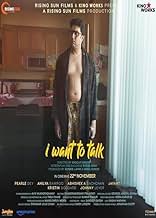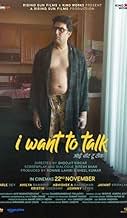A father and his daughter navigate their routine lives in India until an unexpected medical diagnosis alters their path.A father and his daughter navigate their routine lives in India until an unexpected medical diagnosis alters their path.A father and his daughter navigate their routine lives in India until an unexpected medical diagnosis alters their path.
- Director
- Writer
- All cast & crew
- Production, box office & more at IMDbPro
Storyline
Did you know
- TriviaAbhishek gained weight for the role.
- Alternate versionsThe UK release was cut, a cut was required to remove a non-BBFC rating card, in order to obtain a 12A classification. Cut made in accordance with BBFC policy. An uncut classification was not available.
Featured review
"I Want to Talk" is a poignant exploration of human resilience, love, and the indomitable will to live. Directed by the masterful Shoojit Sircar, the film takes us on an emotional journey centered on a man grappling with the harsh realities of a terminal illness. With doctors giving him just 100 days to live, he faces the cruel ticking of the clock. However, rather than succumbing to despair, he chooses to embrace the remaining days of his life with his young daughter, turning a bleak prognosis into a testament to the human spirit.
At the heart of the story is Abhishek Bachchan, who delivers a career-defining performance. He portrays the lead character with such authenticity and depth that the audience feels every ounce of his struggle, joy, and pain. Bachchan's ability to oscillate between vulnerability and quiet strength elevates the film, making his character relatable and inspiring. The scenes between him and his on-screen daughter, played by the talented Ahilya Bamroo, are the emotional cornerstone of the movie. Bamroo, a fresh face, breathes life into her role, skillfully balancing innocence and maturity. Her chemistry with Bachchan adds layers to the narrative, making their bond both heartwarming and heart-wrenching. Even younger version of the daughter Pearl Dey was too good.
The supporting cast, too, deserves special mention. Jayant Kriplani delivers a nuanced performance as the family's trusted confidant, offering moments of wisdom and solace amid the emotional turmoil. Together, the ensemble cast creates a deeply immersive experience, ensuring that no character feels like an afterthought.
Shoojit Sircar's direction is nothing short of exceptional. Known for his ability to weave human stories with artistic finesse, Sircar handles the heavy subject matter with sensitivity and restraint. Rather than leaning into melodrama, he opts for a subtle and contemplative approach, allowing the emotions to emerge organically. His storytelling is compelling, making every moment feel significant without ever becoming overwrought.
A significant contributor to the film's impact is its stunning cinematography by Avik Mukhopadhyay. The handheld camera movements, in particular, are worth applauding. They bring an intimate, almost voyeuristic feel to the narrative, as if the audience is quietly observing the characters' lives unfold in real time. Mukhopadhyay's work captures the fragility and beauty of the fleeting moments that make life meaningful, with every frame telling its own story. The use of natural lighting and close-up shots amplifies the raw emotion, making the audience feel like they're right there with the characters.
The film's narrative structure is simple yet profound. It doesn't rely on elaborate subplots or grandiose twists; instead, it focuses on the small, everyday moments that define human existence. From shared meals to quiet conversations, the film reminds us that life's most significant memories are often found in the mundane. This grounded approach makes the story universally relatable, regardless of the viewer's background.
The soundtrack and background score also deserve a special mention. The music, composed by Shantanu Moitra, perfectly complements the film's tone. The melodies are subtle and understated, allowing the emotions to take center stage. Whether it's the poignant piano pieces during moments of reflection or the gentle strings that underscore the father-daughter bond, the music enhances the narrative without overpowering it.
"I Want to Talk" is more than just a film about a man facing death; it's a meditation on life itself. It asks profound questions about how we choose to spend our time, what truly matters, and the legacy we leave behind. The relationship between the father and daughter serves as a reminder of the power of love and the importance of human connections, even in the face of insurmountable odds.
In conclusion, "I Want to Talk" is a cinematic triumph that lingers long after the credits roll. With stellar performances, masterful direction, and breathtaking cinematography, it stands as a testament to the resilience of the human spirit. It's a film that makes you reflect, feel, and, most importantly, appreciate the fragility and beauty of life. Shoojit Sircar has delivered a masterpiece that deserves to be seen, discussed, and cherished. For anyone seeking a film that moves both the heart and the mind, this is an unmissable experience.
At the heart of the story is Abhishek Bachchan, who delivers a career-defining performance. He portrays the lead character with such authenticity and depth that the audience feels every ounce of his struggle, joy, and pain. Bachchan's ability to oscillate between vulnerability and quiet strength elevates the film, making his character relatable and inspiring. The scenes between him and his on-screen daughter, played by the talented Ahilya Bamroo, are the emotional cornerstone of the movie. Bamroo, a fresh face, breathes life into her role, skillfully balancing innocence and maturity. Her chemistry with Bachchan adds layers to the narrative, making their bond both heartwarming and heart-wrenching. Even younger version of the daughter Pearl Dey was too good.
The supporting cast, too, deserves special mention. Jayant Kriplani delivers a nuanced performance as the family's trusted confidant, offering moments of wisdom and solace amid the emotional turmoil. Together, the ensemble cast creates a deeply immersive experience, ensuring that no character feels like an afterthought.
Shoojit Sircar's direction is nothing short of exceptional. Known for his ability to weave human stories with artistic finesse, Sircar handles the heavy subject matter with sensitivity and restraint. Rather than leaning into melodrama, he opts for a subtle and contemplative approach, allowing the emotions to emerge organically. His storytelling is compelling, making every moment feel significant without ever becoming overwrought.
A significant contributor to the film's impact is its stunning cinematography by Avik Mukhopadhyay. The handheld camera movements, in particular, are worth applauding. They bring an intimate, almost voyeuristic feel to the narrative, as if the audience is quietly observing the characters' lives unfold in real time. Mukhopadhyay's work captures the fragility and beauty of the fleeting moments that make life meaningful, with every frame telling its own story. The use of natural lighting and close-up shots amplifies the raw emotion, making the audience feel like they're right there with the characters.
The film's narrative structure is simple yet profound. It doesn't rely on elaborate subplots or grandiose twists; instead, it focuses on the small, everyday moments that define human existence. From shared meals to quiet conversations, the film reminds us that life's most significant memories are often found in the mundane. This grounded approach makes the story universally relatable, regardless of the viewer's background.
The soundtrack and background score also deserve a special mention. The music, composed by Shantanu Moitra, perfectly complements the film's tone. The melodies are subtle and understated, allowing the emotions to take center stage. Whether it's the poignant piano pieces during moments of reflection or the gentle strings that underscore the father-daughter bond, the music enhances the narrative without overpowering it.
"I Want to Talk" is more than just a film about a man facing death; it's a meditation on life itself. It asks profound questions about how we choose to spend our time, what truly matters, and the legacy we leave behind. The relationship between the father and daughter serves as a reminder of the power of love and the importance of human connections, even in the face of insurmountable odds.
In conclusion, "I Want to Talk" is a cinematic triumph that lingers long after the credits roll. With stellar performances, masterful direction, and breathtaking cinematography, it stands as a testament to the resilience of the human spirit. It's a film that makes you reflect, feel, and, most importantly, appreciate the fragility and beauty of life. Shoojit Sircar has delivered a masterpiece that deserves to be seen, discussed, and cherished. For anyone seeking a film that moves both the heart and the mind, this is an unmissable experience.
- ajayjasra-35039
- Nov 22, 2024
- Permalink
Details
Box office
- Gross worldwide
- $14,223
- Runtime2 hours 2 minutes
- Color
Contribute to this page
Suggest an edit or add missing content


![Watch Trailer [OV]](https://m.media-amazon.com/images/M/MV5BMmYzOGEwNzQtM2U3Ny00Y2U4LWE5YjQtZTk5NGQ1MDBmMmEyXkEyXkFqcGdeQXRyYW5zY29kZS13b3JrZmxvdw@@._V1_QL75_UX500_CR0)



































